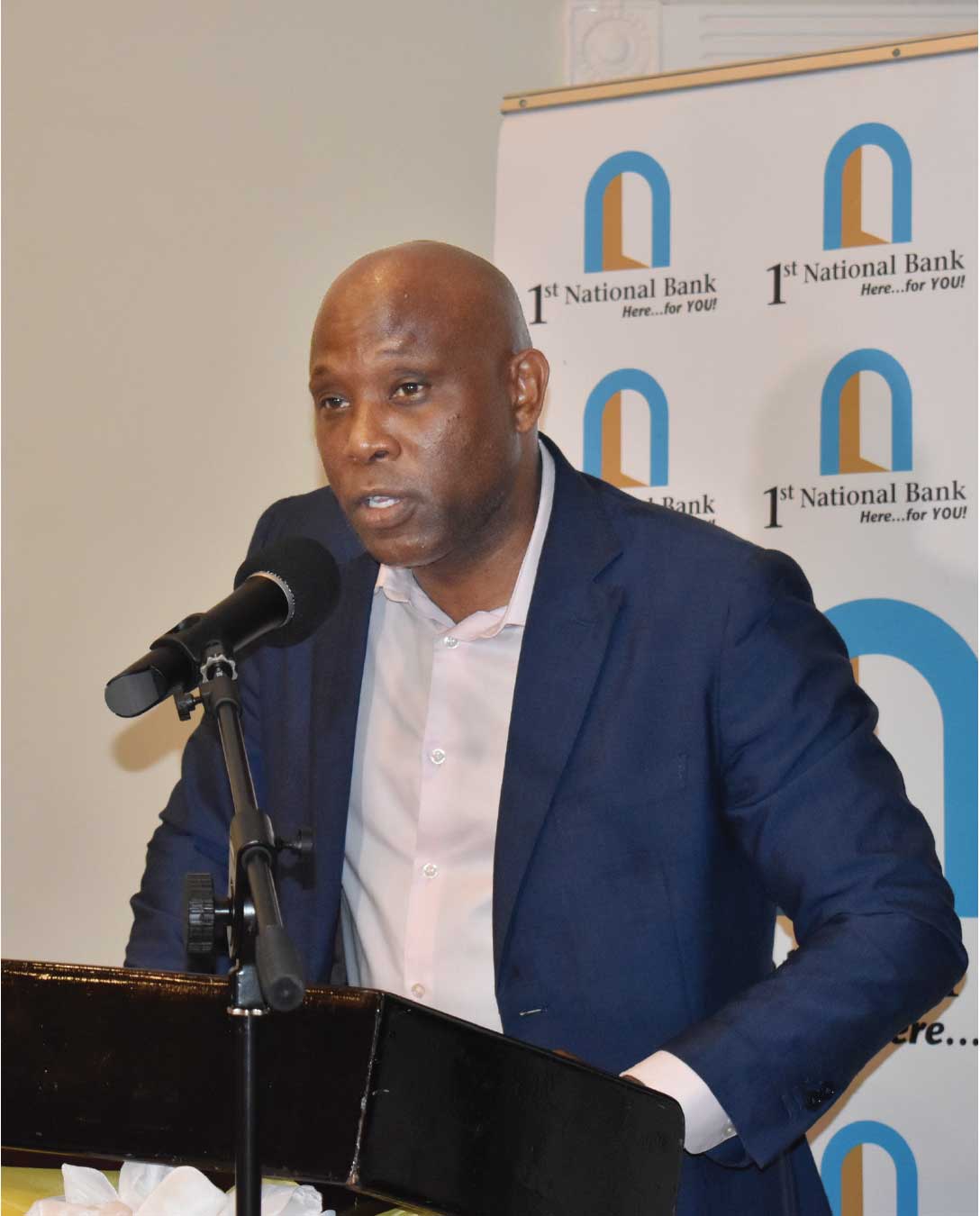
THE 1st National Bank (Saint Lucia) Limited on Wednesday hosted the top executives of the Caribbean Development Bank (CDB), CDB staff, regional and international delegates and other special guests at a special luncheon addressed by the host bank’s Managing Director, Fletcher St. Jean.
Reflecting on the addresses delivered at the opening ceremony at the Sandals Grande Saint Lucian Resort and Spa on Wednesday, MD St. Jean said, “The message was consistent from the host Prime Minister Philip J. Pierre, who spoke on the need for financing to be readily accessible to people and business.”
Addressing fellow bankers and invited guests at the same venue following the June 21 Opening Ceremony, MD St. Jean also noted “The importance the Saint Lucia Prime Minister, who is also Chair of the CDB Board of Governors, has placed on making financing available in the areas of Climate Change resistance and to cater to the needs of the young entrepreneurs.”
The MD also noted that CDB President Dr. Gene Leon had spoken of a “need for a paradigm shift and resilient prosperity for all our citizens.”
St. Jean told the gathered guests that “The COVID-19 pandemic brought about that paradigm shift and collectively, as a region, we experienced economic slumps not seen for 100 years.”
He said, “As a region, we experienced significant unemployment which placed a tremendous burden, not only on governments but also our people, as, together, banks found ways to cater to the needs of our people through (the likes of) Moratorium Initiatives.”
Updating his regional and international peers and other invited guests on the island’s first and only indigenous national bank’s history and latest achievements, St. Jean said, “As we journey from whence we came, 1st National Bank St. Lucia Limited opened for business in January 1938, as The St. Lucia Co-operative Bank, with a capital of $50,000.”
According to the MD, “As we navigated post-COVID, 2021 was indeed a remarkable year” for 1st National Bank, “as, for the first time in our 83-year history, we successfully signed an agreement to acquire the local and neighboring assets and operations of two international banks: Royal Bank of Canada (RBC) and Republic Bank of Trinidad & Tobago (RBTT), which also included the latter’s St. Vincent and the Grenadines operations.”
He continued, saying: “This acquisition signaled a move from whence we came – from a ‘Penny Bank’ in 1938 to today solidifying our strength and stability as we continue to grow and expand our financial footprint…”
St. Jean reported that currently, 1st National Bank stands firm as “a $1.7 billion-dollar regional financial institution with operations in St. Lucia and St. Vincent.”
He described these accomplishments, at home and abroad, as “milestones that the institution’s founding fathers, shareholders, customers, Board of Directors, staff, and all those who have contributed to the development to the growth of this institution, should be extremely proud of.”
The MD told his esteemed luncheon guests, “Our commitment to serving our people here in St. Lucia and St. Vincent is evident,” revealing that: “Thus far for 2023, we have issued nearly $100 Million in financing” because “as a bank, we recognize our importance in stimulating economic growth.”
St. Jean described these achievements as proof that “We are Building Better Together!”
He also assured his regional and international guests, “We again give our commitment to the markets we serve, that 1st National Bank St. Lucia Limited is Always Here For you!”
To highlight his bank’s role and offer a better appreciation of its historical standing, the MD quoted Saint Lucia’s first Prime Minister and Minister of Finance Sir John G. M. Compton, who, in his view, “said it best…”
Sir John, Mr Fletcher recalled, had famously said: ‘Any tribute to the St. Lucia Co-operative Bank is indeed a tribute to those St. Lucians who, in the midst of the World Depression of the 1930’s had the courage and foresight and the confidence in our people, to pioneer the creation of an institution designed to meet the needs of those of our poor but industrious people, whose requirements were not adequately catered for by the regular commercial banks…’





![Attendees at the UHC logo and website launch [Photo credit: GOSL]](https://thevoiceslu.com/wp-content/uploads/2026/02/Attendees-at-the-UHC-logo-and-website-launch-380x250.jpg)






![Remnants of an alleged drug boat blown up in a lethal strike by the U.S. military last week surfaced off Canouan on Saturday [Photo credit : St Vincent Times]](https://thevoiceslu.com/wp-content/uploads/2026/02/Remnants-of-an-alleged-drug-boat-blown-up-380x250.jpg)
